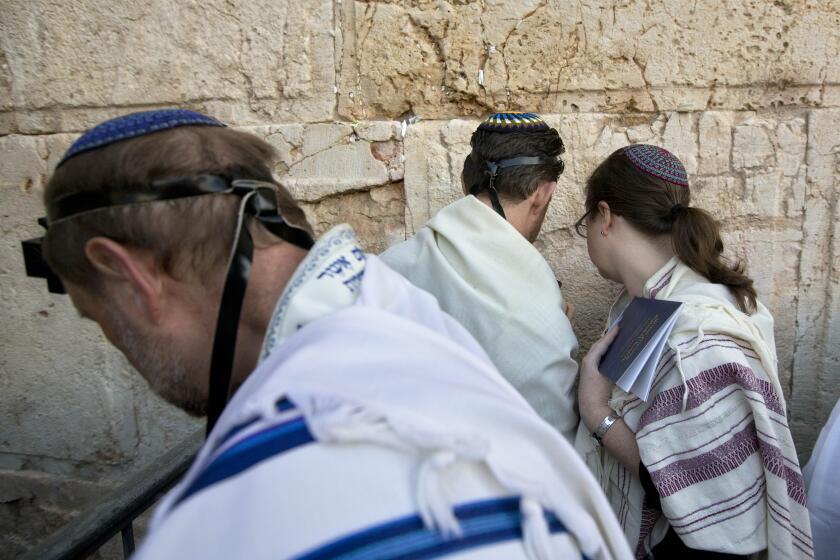With vote count done, an Islamist party in Israel may hold key to Netanyahu’s fate

- Share via
JERUSALEM — With the last votes tallied Thursday, the outcome of Israel’s latest election — and the fate of Prime Minister Benjamin Netanyahu — now appears to rest in the hands of small parties, including an upstart Arab Islamist group whose surprise showing has redrawn the political landscape.
Netanyahu’s Likud lost two seats in the Knesset, Israel’s parliament; the bloc that he controls, including his ultra-Orthodox allies, now holds at 52 seats. The deeply disunited parties that oppose his continued leadership are represented by 57 out of the Knesset’s 120 members, meaning that neither side has the 61 seats necessary to form a new government.
The balance of power appears to lie in the hands of Yamina, a right-wing party led by a former Netanyahu ally, and the United Arab List — or Raam, as it’s known by its Hebrew acronym — a party affiliated with the Islamist movement. Yamina won seven seats and Raam four.
That has unexpectedly cast Mansour Abbas, Raam’s leader, as the potential kingmaker in a political arena that has traditionally denied Arabs influence and a space at the top table. Jewish Israelis in particular were only beginning Thursday to digest the possibility that a Muslim party could decide both the political orientation of the next government and Netanyahu’s future.
“Without Mansour Abbas, Bibi has no government,” economist Antoine Eliaroni tweeted, using Netanyahu’s nickname. “Karma is a bitch.”
Abbas, a virtual political unknown, in January took Raam out of the Joint List, an electoral coalition of four established Arab parties. His Islamist party campaigned against assimilation, modernization and LGBTQ rights, and advocated acquiring power for Arab Israelis through working with other conservative parties, including ardently Jewish ones.
In a blow to the religious establishment, Israel’s high court says converts through Judaism’s Reform and Conservative movements are indeed Jewish.
Israeli Arabs, both Muslim and Christian, make up about 21% of Israel’s population. Raam drew almost half of the Joint List’s traditional voters at the polls Tuesday.
In an interview with the Los Angeles Times, Abbas campaign manager and strategist Aaed Kayal described Raam’s base as “people who want a more conservative Arab society, but also people who want to influence, want to be part of the game and want to advance.”
“We will have to manage to [work with] what there is,” Kayal said. “It is much better to be an influential body, neither right nor left, and act and vote according to our principles.”
Netanyahu had encouraged Abbas to ditch the Joint List in hopes of splintering the Arab vote and even campaigned alongside the 46-year-old dentist — a remarkable reversal of his tactics in previous elections, during which he called Arab political leaders terrorists.
A leading Israeli human rights group has begun describing both Israel and its control of the Palestinian territories as a single ‘apartheid’ regime.
Now, ironically, Netanyahu finds himself within spitting distance of being booted from the prime minister’s office because of Raam’s success and being without a parliamentary majority if Abbas sides with the “Never Bibi” bloc.
“Abbas could turn out to be the ultimate kingmaker between the pro-Netanyahu and the anti-Netanyahu blocs,” said political activist Afif Abu Much. “Abbas’ promise [that] ‘we’re not in anybody’s pocket’ seems to have worked.”
Netanyahu’s path to a new government is blocked by ally Bezalel Smotrich, who leads the extremist Religious Zionist Party, which won six seats, and who has flatly ruled out the idea of working with Raam.
“There will not be a right-wing government dependent on Mansour Abbas’ Raam,” Smotrich wrote on his Facebook page.
Breaking News
Get breaking news, investigations, analysis and more signature journalism from the Los Angeles Times in your inbox.
You may occasionally receive promotional content from the Los Angeles Times.
Netanyahu, Israel’s longest-serving leader, is desperate to hold on to power in the face of his ongoing trial on corruption charges — a first for an Israeli prime minister. He had hoped at least to keep the speakership of the Knesset in his Likud Party’s hands, to control the legislative agenda, but that, too, may now be out of reach.
Even if the right-wing Yamina party, headed by former Netanyahu ally Naftali Bennett, were to throw in its lot with Likud, Netanyahu would still be short of a parliamentary majority.
“It is all over now,” said Anshel Pfeffer, a political analyst with the newspaper Haaretz and a biographer of Netanyahu. “Netanyahu can form a government only with defectors or by getting the Jewish supremacists to sit with the Islamists.”
Netanyahu ran a relentless campaign, his fourth bid in less than two years to secure an outright parliamentary majority. He highlighted his decades of experience in diplomacy and Israel’s successful COVID-19 vaccination campaign as his top selling points.
But Israelis, who are accustomed to an efficient healthcare system and more focused on domestic challenges than on foreign policy, failed to reward him in sufficient numbers. Additionally, Netanyahu’s efforts on behalf of the Religious Zionist Party, which advocates a Jewish theocracy, cannibalized some of the traditional Likud base.
“It is clear that Netanyahu doesn’t have a majority for a coalition,” Gideon Saar, a former Likud minister who broke away to form the right-wing, good-governance New Hope party. “We must work to fulfill the potential for forming a government of change.”
More to Read
Sign up for Essential California
The most important California stories and recommendations in your inbox every morning.
You may occasionally receive promotional content from the Los Angeles Times.












